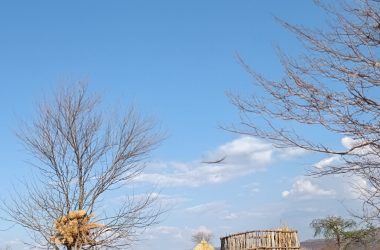 Lands, Agriculture, Fisheries, Water and Rural Development Permanent Secretary Dr John Basera says promoting sustainable agricultural practices is crucial in mitigating the impact of invasive species on Zimbabwe’s ecosystems.
Lands, Agriculture, Fisheries, Water and Rural Development Permanent Secretary Dr John Basera says promoting sustainable agricultural practices is crucial in mitigating the impact of invasive species on Zimbabwe’s ecosystems.
“These practices include crop rotation, integrated pest management, and the use of native plant species, which can strengthen the resilience of our agricultural systems and reduce the reliance on chemical inputs that may inadvertently harm native species,” said Dr Basera.
Dr Basera was speaking at a workshop to initiate the process of reviewing and updating the National Biodiversity Strategy and Action Plans following the recent adoption of the new biodiversity strategy, “the Kunming-Montreal Global Biodiversity Framework”, which was adopted at the Fifteenth Session of the Conference of Parties meeting of the Convention of Biological Diversity held in Montreal, Canada, November 2022.
 The global assessment report on IAS by the Intergovernmental Science-Policy Platform on Biodiversity and Ecosystem Services (IPBES) has identified that more than 37,000 alien species have been introduced by human activities to regions and biomes around the world.
The global assessment report on IAS by the Intergovernmental Science-Policy Platform on Biodiversity and Ecosystem Services (IPBES) has identified that more than 37,000 alien species have been introduced by human activities to regions and biomes around the world.
It also reveals that alongside dramatic changes to biodiversity and ecosystems, the global economic cost of invasive alien species exceeded $423 billion annually in 2019, with costs having at least quadrupled every decade since 1970. A study by Madzara in 2013 indicates that the government of Zimbabwe spends US$50 million annually to fight invasive alien plant species and livestock diseases.
Dr Basera called for investment in research and scientific studies to enhance understanding of invasive species prevalent in the region.
“By identifying the species that pose the greatest risk and studying their habits, reproduction patterns, and preferred habitats, we can develop targeted and effective strategies to manage and control their populations. Furthermore, education and awareness campaigns are vital in engaging farmers and the general public. By providing information on the impact of invasive species and sharing best practices for prevention, early detection, and eradication, we can empower individuals to identify and report potential invasive species outbreaks. Collaboration with agricultural extension services, NGOs, and farmer cooperatives will be key to disseminating this knowledge and ensuring its effective implementation at the grassroots level,” he added.
Of the 23 Global Biodiversity Targets, FAO has identified more than 18 targets relevant to the agriculture sector which includes crop and livestock sectors, forestry, fisheries and aquaculture, according to Dr Patrice Talla, Subregional Coordinator for Southern Africa of the Food and Agriculture Organization of the United Nations (FAO).
 “This workshop focuses on Target 6 – To reduce rates of introduction and establishment of invasive alien species by 50 per cent. Invasive Alien Species now play a crucial role in 60% of global plant and animal extinctions, and their impact annually is now estimated to be above $423 billion. The figures have quadrupled every decade since 1970,” said Dr Talla.
“This workshop focuses on Target 6 – To reduce rates of introduction and establishment of invasive alien species by 50 per cent. Invasive Alien Species now play a crucial role in 60% of global plant and animal extinctions, and their impact annually is now estimated to be above $423 billion. The figures have quadrupled every decade since 1970,” said Dr Talla.
“Protecting biodiversity includes stopping the spread of invasive alien species. Therefore, the need for mainstreaming biodiversity into sustainable agricultural policies and practices is a core element of FAO programming. FAO adopted its strategy on Mainstreaming Biodiversity across Agricultural Sectors in 2019 and has approved the 2021-23 Action Plan for implementing the FAO Strategy on Mainstreaming Biodiversity across agricultural sectors,” he added.
The threats posed by Invasive Alien Species (IAS) and potential impacts of most alien species in Zimbabwe are still to be assessed
To reduce the impact of IAS, there is need to quantify the extent of invasiveness of other alien species through systematic studies and ecological niche modelling, to determine their environmental, ecological, social and economic effects, and then, if necessary, formulate a policy and action plan to combat the spread of potential IAS, according to the Permanent Secretary for Environment, Climate and Wildlife, Ambassador Raphael Tayerera Faranisi.
“It is my honor to be with you at this workshop to deliberate on developing action plans for reducing the Impacts of Invasive Alien Species (IAS) in Zimbabwe. This process is critical as the United Nations Environment Programme has reported that the threat posed by invasive alien species is underappreciated, underestimated, and often unacknowledged,” said Faranisi.
The strategy aims to mainstream biodiversity across agricultural sectors at national, regional and international levels in a structured and coherent manner, considering national priorities, needs, regulations, policies and country programming frameworks.
“The expected result of applying the Strategy would be to reduce the negative impacts of agricultural practices on biodiversity, promote sustainable agricultural practices, conserve, enhance, preserve, restore and sustainably use biodiversity across agricultural sectors, and, most importantly, reduce rates of introduction and establishment of invasive alien species to be specific to the context of this workshop,” said Dr Talla.
Zimbabwe is a party to several international conventions and agreements that address the issue of invasive alien species which include:
Convention on Biological Diversity (CBD): The CBD is a global agreement that aims to conserve biodiversity, promote sustainable use of natural resources, and ensure the fair and equitable sharing of benefits arising from biodiversity. Invasive alien species are addressed under the CBD’s Strategic Plan for Biodiversity 2011-2020, which includes targets for preventing the introduction of invasive alien species and their control or eradication.
International Plant Protection Convention (IPPC): The IPPC is an international treaty that aims to protect cultivated and wild plants by preventing the spread and introduction of pests and diseases. The Convention includes provisions for the control and management of invasive alien species that harm plant health.
These conventions play a crucial role in promoting international cooperation and coordinating efforts to address the introduction and spread of invasive alien species. They encourage member countries to develop national strategies, policies, and measures to prevent, control, and manage invasive species, thereby protecting ecosystems, biodiversity, and agricultural systems.









